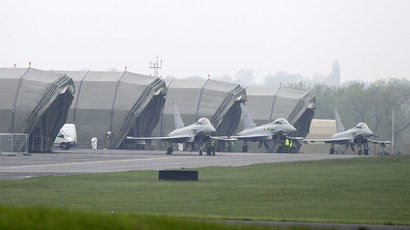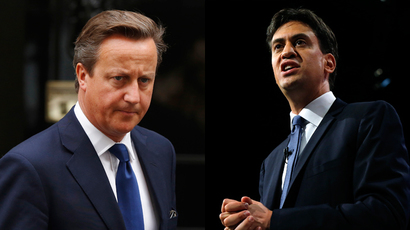UK MPs vote overwhelmingly for ISIS airstrikes in Iraq
MPs have voted to back Britain joining US-led airstrikes on Islamic State in Iraq in a vote on Friday. Attacks could begin within days, as ministers admit that UK military intervention could last two or three years.
READ ALSO:Anti-ISIS military campaign 'could go on for years' – UK Defence Secretary
‘Don't bomb Iraq & Syria!’ Stop the War protests at Downing Street
MPs voted overwhelmingly in favour of strikes against Islamic State (also known asISIS, or ISIL), with 524 voting for and 43 voting against.
Britain’s three biggest parties, coalition government partners the Conservatives and Liberal Democrats, plus the opposition Labour party, all officially backed the bombing campaign. The government insisted the intervention was legal under international law because it was requested by the Iraqi prime minister.
The motion did not propose any UK involvement in airstrikes in Syria, where a US-Arab coalition began bombing IS militants on Tuesday. A year ago, British MPs rejected airstrikes on Syria to oppose the government of President Bashar Assad.
In a sign of nervousness over possible Islamic State retaliation against the UK, London Mayor Boris Johnson has urged the city's residents to remain “vigilant” on public transport.
Cameron told MPs early in Friday's debate the situation in Syria is “more complicated” than Iraq because of its "brutal dictator" President Assad and the civil war that has been ongoing there for the past three years.
You can read the Government motion for today's Commons debate on #Iraq: coalition against ISIL in the Order Paper http://t.co/lm4llioal0
— House of Commons (@HouseofCommons) September 26, 2014
The cause of the problem is the “poisonous narrative of Islamist extremism”, said Cameron, adding that Muslims must “reclaim their religion from these extremists”.
Cameron called for political efforts to support an “inclusive” and “democratic” governments in Iraq and Syria. But he added that the British military has an indispensable role to play. There is “no realistic prospect” of defeating Islamic State without it, the PM said. The Iraqi government“need our military help and it is in our interest and theirs to give it.”
He told MPs they had to weigh up the consequences of both action and inaction. “If we allow ISIL to grow and thrive there's no doubt in my mind that the level of threat to the country would increase.”
Referring to the UK’s intervention in Iraq in 2003, Cameron said: “This is not 2003 but we must not use past mistakes as an excuse for indifference or inaction.”
The Labour leader of the opposition, Ed Miliband, supported the PM's statement, but called for diplomatic efforts to go hand-in-hand with airstrikes.
“Those who advocate military action today have to persuade members of this House and the country not only that ISIL is an evil organisation but that it is we, Britain, who should take military action in Iraq,” said Miliband.
“Intervention always has risks but a dismembered Iraq would be more dangerous for Britain,”he added.
Miliband told MPs there is "already evidence" that the US-led airstrikes are having the effect of holding back Islamic State. He also believes that the action being proposed is proportionate.
The CIA estimates IS could have as many as 31,000 fighters in Iraq and Syria, where the group have seized large swathes of territory in recent months.
IS threatened to kill British hostage Alan Henning in a video showing the beheading of British aid worker David Haines earlier this month. Haines’s daughter backed proposed airstrikes on Wednesday and said that IS should be “eradicated”.
UK Defence Secretary Michael Fallon says Britain’s armed forces will be involved in Iraq for the “long haul” of at least three or four years to defeat IS. Speaking to House magazine, he said Britain has a “very direct interest” in battling IS to stop terrorist attacks on British soil.

Concerns have been raised over the UK's allies in action against IS. Conservative MP Zac Goldmsith has cautioned that the UK needs to take a “much tougher line” toward its allies such as Saudi Arabia “who have been fuelling and funding terrorism for decades”.
Despite cross-party unity on intervention, some MPs vowed to vote against the airstrikes.
43 votes against the third Iraq War
— George Galloway (@georgegalloway) September 26, 2014
SNP MPs to vote against military action in Iraq as they have "deep deep worries" re a "3rd Iraq War" says @MorayMP
— Nick Robinson (@bbcnickrobinson) September 26, 2014
Sat all day in Commons but Never got called to speak in Iraq debate.What happened to democracy & balanced debate. Disgusted.
— John McDonnell (@johnmcdonnellMP) September 26, 2014
Labour MP Rushanara Ali, the shadow education minister, resigned from the party’s front bench to abstain from a vote on military action in Iraq. Whips from each of the main parties had told their members to support the motion.
Anti-war activists staged an emergency protest outside Downing Street on Thursday evening against the possibility of military action in Iraq.

UKIP leader Nigel Farage, who was holding his party’s annual conference at Doncaster Racecourse on Friday, a stone’s throw from Labour leader Miliband’s constituency, has also criticised the government’s plan for airstrikes.
“The trouble with bombing is you kill lots of civilians,” Farage told the BBC.
He argued that any successful operation would require “boots on the ground”, but said there was no appetite for that.
However, a poll conducted for The Sun newspaper, published on Friday, revealed that 57 percent of UK residents surveyed said they supported bombing IS in Iraq, compared to 24 percent who were against it.
Support for a bombing campaign is up by one-fifth on a similar poll last month.
Asked whether they backed strikes on IS in Syria, 51 percent approved of spreading the intervention while 26 percent opposed it. Meanwhile, 43 percent backed sending ground troops to Iraq, or considering sending them there.














